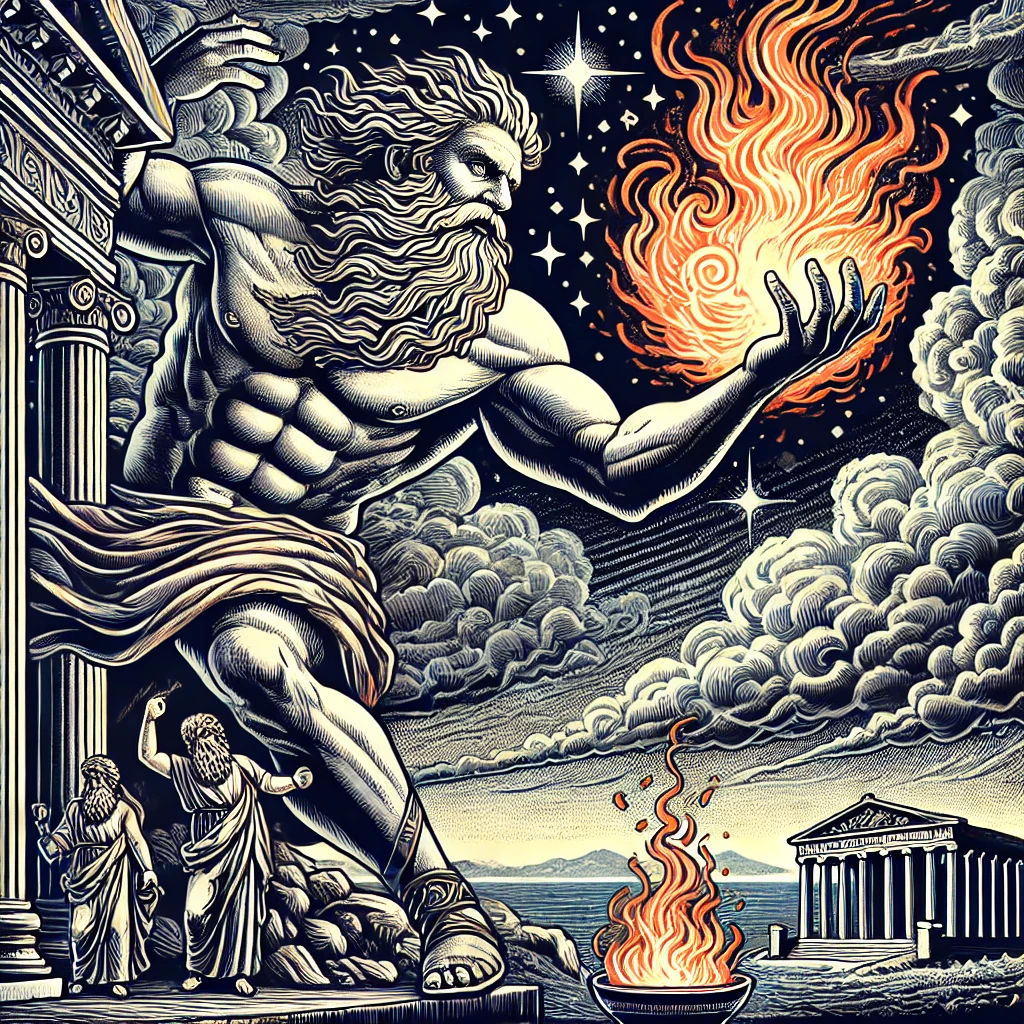In the rich tapestry of Greek mythology, few figures are as compelling and consequential as Prometheus. Known as the cunning Titan who defied the might of Zeus to steal fire and bestow it upon humanity, Prometheus embodies the spirit of rebellion and foresight. This act not only marked a pivotal moment in Greek mythology but also established a legacy of challenging authority and igniting change that resonates through the ages. Today, the Prometheus Myth Impact continues to influence modern thought, offering profound insights into our continual struggle with innovation versus ethics. As we delve into this ancient narrative, we uncover enduring lessons about human ingenuity and its consequences, which are as relevant now as they were in the time of gods and mortals. For a deeper exploration of Greek myths and their origins, consider checking out our recently released book, Greek Mythology for Beginners, which delves into the stories that have shaped Western culture.
The Myth and Its Message

Prometheus, one of the most intriguing figures in Greek mythology, is renowned not just for his intelligence but also for his pivotal role in shaping human destiny. According to myth, Prometheus defied the supreme god Zeus by stealing fire from the heavens. This act was not merely a theft of flame, but a transfer of knowledge and power from the divine realm to mankind. Fire, in this context, symbolizes enlightenment and progress, enabling humanity to craft tools, cook food, and fend off the darkness.
Modern Reflections of Prometheus
The story of Prometheus has transcended Greek mythology to become a metaphor for the modern struggle between innovation and regulation. Today, Prometheus’s act of giving fire to humanity is paralleled by the breakthroughs in science and technology that challenge existing ethical boundaries. As we advance in fields like artificial intelligence, genetic engineering, and renewable energy, we grapple with questions that reflect the Prometheus dilemma: How far should we go in pursuit of knowledge and at what cost?
Modern Reflections of Prometheus
The story of Prometheus has transcended Greek mythology to become a metaphor for the modern struggle between innovation and regulation. Today, Prometheus’s act of giving fire to humanity is paralleled by the breakthroughs in science and technology that challenge existing ethical boundaries. As we advance in fields like artificial intelligence, genetic engineering, and renewable energy, we grapple with questions that reflect the Prometheus dilemma: How far should we go in pursuit of knowledge and at what cost?
The ethical challenges in AI, for instance, mirror the predicaments Prometheus faced—balancing the boon of divine fire with the curse of eternal punishment. For a deeper dive into these modern ethical debates, consider reading AI and Ethics: Navigating the Challenges and Opportunities, which explores how we can responsibly harness AI’s capabilities while managing its risks. This article from GISMA offers insights into maintaining ethical integrity as we push the boundaries of what AI can achieve, emphasizing the importance of transparency, accountability, and fairness in technological advancements.
Prometheus in Literature and Popular Culture
Prometheus’s influence extends far beyond the ancient texts of Greek mythology; he has been a significant figure in literature and popular culture, symbolizing the quest for knowledge and the consequences of human ambition. His story has been adapted and reimagined in countless ways, reflecting society’s evolving values and challenges.
One of the most famous literary adaptations is Mary Shelley’s “Frankenstein; or, The Modern Prometheus.” In this seminal work, Shelley explicitly draws a parallel between Dr. Victor Frankenstein, who creates life through scientific means, and Prometheus, who defied the gods to bring fire to humanity. Both figures deal with the fallout of transcending natural boundaries, exploring themes of creation, responsibility, and punishment. This novel remains a poignant commentary on the dangers of unchecked scientific endeavor and the moral obligations of creators.
In the realm of cinema, Prometheus often appears as a metaphor for resistance against oppressive forces. Films such as Ridley Scott’s “Prometheus” explore similar themes of creation and the search for divine knowledge, questioning the origins of humanity and the consequences of seeking out forbidden truths. These stories resonate with contemporary audiences, highlighting the timeless appeal of Prometheus as a symbol of rebellion and the pursuit for understanding.
Additionally, Prometheus’s story has influenced various forms of art, from classical paintings to modern digital art, where his image is often used to represent the struggle against censorship and the pursuit of intellectual freedom. Artists depict Prometheus not just as a mythological figure but as a modern-day hero whose spirit challenges societal norms and inspires change.
Moreover, the Prometheus myth has found its way into comic books and graphic novels, where characters inspired by the Titan embody themes of resilience and the fight for justice. These adaptations are particularly effective in engaging younger audiences and introducing them to the rich layers of meaning within Greek mythology.
Through these various representations, Prometheus continues to be a powerful icon in literature and popular culture. His story prompts us to reflect on our own quests for knowledge and the ethical dimensions of our actions, making him a relevant and compelling figure in modern discussions about technology, freedom, and the human condition.
To see how myths continue to inspire contemporary media, don’t miss our roundup of the 6 Must-Watch TV Shows Based on Myths You Can’t Miss in 2025, featuring modern adaptations that breathe new life into ancient stories.
Conclusion
The enduring legacy of Prometheus, a pivotal figure in Greek mythology, continues to illuminate the complexities of human ambition and the quest for knowledge. His story, symbolizing the acquisition of forbidden knowledge at a great personal cost, resonates deeply with contemporary issues, from technological ethics to environmental sustainability. As we navigate the challenges of modern innovations, Prometheus serves as a compelling archetype, reminding us of the potential consequences of our pursuits and the importance of ethical considerations.
The stories of Prometheus and other mythical figures remain profoundly relevant today, as explored in our feature on The Enduring Relevance of Mythology: How Ancient Stories Shape Modern Culture, highlighting how these ancient narratives continue to influence our contemporary world.
The tale of Prometheus is not merely an ancient myth but a living narrative that echoes through our cultural, technological, and ethical landscapes. It encourages us to question the limits of human endeavor and to ponder the balance between our capabilities and our responsibilities. Whether in literature, film, or public discourse, the figure of Prometheus urges us to reflect on the dual nature of human progress: the potential for great benefit and significant risk.
As we continue to explore and push the boundaries of what is possible, the Prometheus myth offers a valuable framework for understanding the implications of our actions. It challenges us to think critically about the path of progress we choose and to ensure that our innovations, like Prometheus’s fire, are used to enlighten and benefit humanity, rather than to overreach or dominate.
As we carry forward the torch of knowledge handed down through the ages, let us do so with the wisdom and caution that the story of Prometheus teaches. May his tale inspire us to approach the future with both the courage to innovate and the wisdom to foresee the consequences of our creations.
And How? How do you see the Prometheus myth reflected in today’s world? Are there instances in modern science, technology, or culture where you recognize the spirit of Prometheus at play? Share your thoughts and experiences in the comments below. Let’s discuss how these ancient stories continue to shape our understanding of innovation, responsibility, and the ethical dilemmas we face in our quest for progress. Join the conversation and help us explore the relevance of Greek mythology in shaping modern narratives.




I must say this article is extremely well written, insightful, and packed with valuable knowledge that shows the author’s deep expertise on the subject, and I truly appreciate the time and effort that has gone into creating such high-quality content because it is not only helpful but also inspiring for readers like me who are always looking for trustworthy resources online. Keep up the good work and write more. i am a follower. https://webdesignfreelancerfrankfurt.de/